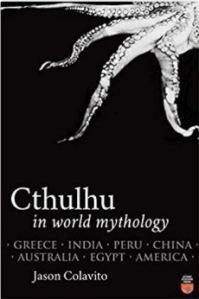 Anyone who has spent time amid scholarly religion tomes knows how cases used to be made for connections.Similarities were seen as parallels, and it wasn’t unusual for the learned to assert that ideas were organically related.This same style (now much out of date) was borrowed by writers proposing that what we now call “ancient astronauts” visited the earth and helped with things like the pyramids of Egypt and Stonehenge.Jason Colavito knows how to parody such writing as he demonstrates in his Cthulhu in World Mythology.Known as a skeptic and critic of what he calls “pseudoscience,” Colavito is also a Lovecraft aficionado.This tongue-in-cheek treatment approaches the subject with an earnestness that almost convinces the reader that Colavito actually believes what he is writing.Meanwhile he’s poking fun at those who like to draw untenable parallels and invent unwarranted scenarios.
Anyone who has spent time amid scholarly religion tomes knows how cases used to be made for connections.Similarities were seen as parallels, and it wasn’t unusual for the learned to assert that ideas were organically related.This same style (now much out of date) was borrowed by writers proposing that what we now call “ancient astronauts” visited the earth and helped with things like the pyramids of Egypt and Stonehenge.Jason Colavito knows how to parody such writing as he demonstrates in his Cthulhu in World Mythology.Known as a skeptic and critic of what he calls “pseudoscience,” Colavito is also a Lovecraft aficionado.This tongue-in-cheek treatment approaches the subject with an earnestness that almost convinces the reader that Colavito actually believes what he is writing.Meanwhile he’s poking fun at those who like to draw untenable parallels and invent unwarranted scenarios.
All of this is accomplished by using H. P. Lovecraft’s brainchild Cthulhu.Good old-fashioned common sense tells readers that a fictional god-monster created by a fiction writer is not to be believed.What Colavito does, with a straight face (or straight pen) is pretend all this is real.Finding tenuous connections between ancient myths and words that can, from certain angles, resemble the name Cthulhu, Colavito takes the unwary reader down the garden path that suggests Cthulhu was the origin of nearly all world mythologies.Or rather that all world mythologies are reflections and recollections of when Cthulhu was widely known.Treating both fiction and factual sources with footnotes, this is a fanciful romp through “research” published by fictional characters made up by Lovecraft right next to actual sources where scholars are addressing something else, most of them in older tomes.
As an example of good fun, one thing worries me about the book.Granted, it was published before the great Cthulhu was elected in 2016, but many people today have difficulty discerning actual facts from alternative facts.“Fake news” can cover a host of sins.Reconstructing the ancient past is notoriously laborious.Not having written records means guesses are necessary.When writing does appear it is so far removed from contemporary uses of the art that its original usages are sometimes completely opaque.Receipts we understand.Myths not so much.Rituals even less.Many scholars spend their lives in attempting some logical reconstruction of ancient cultures.We have very little scientific means to test them.It might make sense, in such situations, to offer Cthulhu as a suggestion for filling the gaps.
